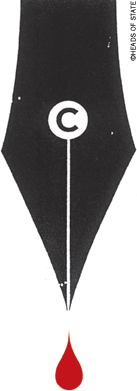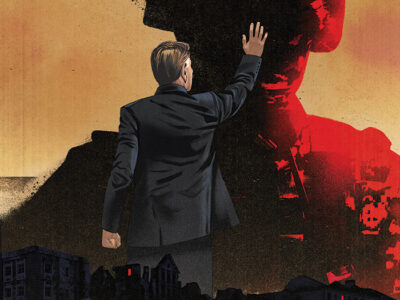
Time was, if you did an Internet search on Dr. Daniel Hoffman, the Felix E. Schelling Professor Emeritus of English and former U.S. poet laureate, the first hits would be references to his various books. Now, he points out, “you get 138 repetitions of The New York Times article” on his part in a high-profile lawsuit against Google.com.
Though there is a dollop of humor in the poet’s remarks, Hoffman is serious about his grievance with the Google Library Project (books.google.com/), charging that it’s making unfair use of copyrighted books by digitally scanning the texts of several major libraries and then posting portions of them online. Besides Hoffman, the lawsuit’s plaintiffs include the Authors Guild, children’s author Betty Miles, novelist Herbert Mitgang, and the Association of American Publishers. (A longtime Authors Guild member, Hoffman says he was asked by the president to serve as one of the individual plaintiffs—“and I was glad to do it.”)
“We don’t want any writer to get ripped off,” he says, noting that Google has not asked for the permission of copyright owners to digitize their works. “We feel as authors that we should get our share [of Google’s profits]—similar to the royalties from book publication. It’s not that we oppose spreading information through the Internet. It’s simply that we want it done on a fair basis.”
For its part, Google states that it will exclude books from scanning if contacted by the copyright holders. It also will limit its display of copyrighted works to “snippets” of text unless it has permission to post longer passages. In addition, it will include links to online bookstores where the books can be purchased.
According to its website, “Our ultimate goal is to work with publishers and libraries to create a comprehensive, searchable, virtual card catalog of all books in all languages that helps users discover new books and publishers discover new readers.”
Instead of suing Google, maybe “they should be sending roses and fruit baskets,” says Joel Waldfogel, a professor of business and public policy at Wharton who contrasts this case with his studies on the CD-buying habits of students who download music files. “Having access to a few pages is not the same as having a song,” he argues. “It’s much more like an advertisement for the book than a substitute for the book. “I suspect that for authors who aren’t terribly well known, being on Google will be great,” Waldfogel adds.
But for Hoffman, whose latest work is Makes You Stop and Think: Sonnets, even a little text is a lot. “In my case one page can have an entire poem.”
Lawrence Lessig C’83 W’83, a Stanford law professor with an expertise in cyber-law [“Constitutionalist in Cyberspace,” November/December 1998], believes that Google’s project constitutes “fair use” under copyright law. “If it’s fair use, you neither have to ask permission nor do you have to cough up any of your profits.”
“When I write a book and use fair-use quotes [from another author’s text], I don’t write [them] a check,” he says. “The New York Review of Books has advertising [but] they don’t have to give the profits from the ads back to the authors” of reviewed books.
It’s unreasonable to expect Google to track down copyright owners for permission, particularly when about 23.5 million books are under copyright but no longer in print, Lessig adds. “Many of these presses no longer exist, and there’s no place to go. When the author dies the copyright passes down through the family like a necklace passes down through the family. Just as it would be impossible for Saks Fifth Avenue to track down all the necklaces it sold in 1935, it would be impossible to track down all the copyright owners for copyrights issued in 1935.”
The books involved in the project come from the New York Public Library as well as the libraries of the University of Michigan at Ann Arbor, Harvard, Stanford, and Oxford. Though Penn isn’t a participant, Carton Rogers, vice provost and director of libraries, is watching the Google project closely.
“I certainly think digitization is a good way to go, and it will eventually make large library collections available to people who haven’t had access to them before,” he says. “We would like to be a player at some level in these projects.”
Rogers points to the Internet Archive as a similar effort that has avoided controversy by limiting its digital collections to works in the public domain. The archive has also spawned bookmobiles that travel around developing countries, printing digitized material on demand at low cost.
But with all the money and resources spent digitizing large “stacks collections,” Rogers hopes people don’t lose sight of the need to preserve truly rare and valuable works, “such as medieval manuscripts held only at Van Pelt Library.”
“That’s where we’ve been putting more of our effort,” he says. “There’s this whole sense of hidden collections in all of our libraries. That’s where digitizing can make a difference.”
—S.F.




